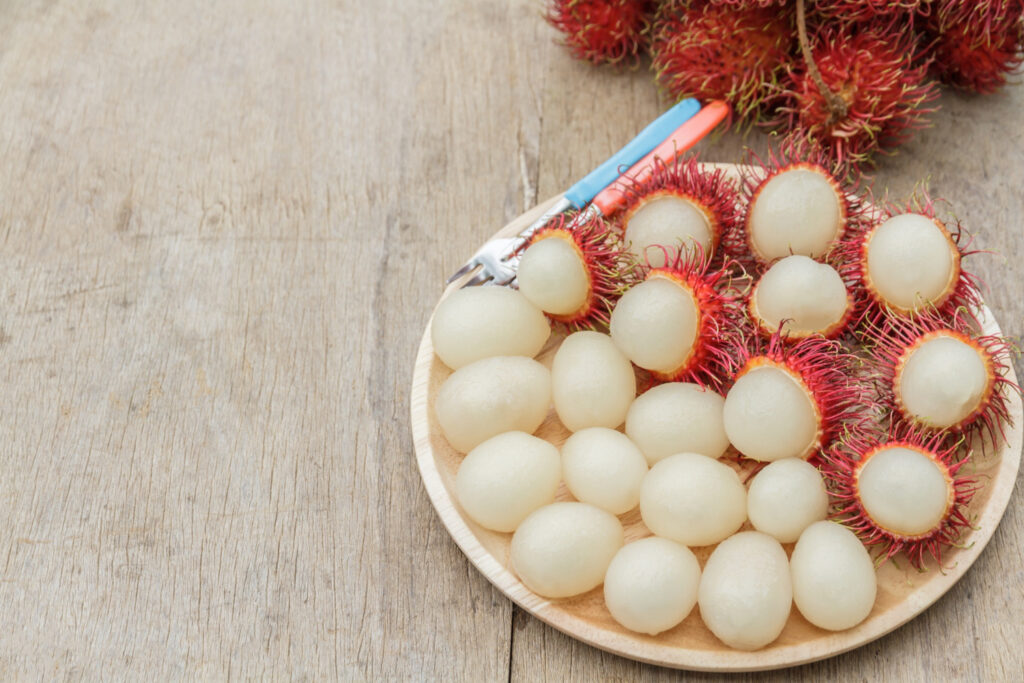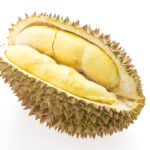
Fast Facts
Rambutan is native to Malaysia and named after the Malay word for “hair
A 100-gram serving of rambutan can provide up to 77% of the Daily Value for vitamin C
Rambutan is rich in antioxidants like polyphenols and flavonoids
The fruit is a good source of both soluble and insoluble fiber, promoting digestive health
Rambutan is high in essential minerals like copper, manganese, and niacin
Fresh rambutan is more nutritious than canned rambutan in heavy syrup
Consuming rambutan can help reduce the risk of chronic diseases like heart disease and cancer
Nephelium lappaceum, commonly known as rambutan, is a tropical tree native to Malaysia. It produces small fruits with reddish-colored, leathery skin covered in flexible spines or hairs known as spinterns. The name “rambutan” comes from the Malay word “rambut,” which means “hair.”
Nutritional Profile
Rambutan fruits are technically classified as berries. They are juicy, sweet, and mildly acidic due to their high vitamin C content. Besides being rich in vitamin C, rambutans provide fiber, protective plant compounds, and several vitamins and minerals.
High in Vitamin C
Rambutans are especially rich in vitamin C, a water-soluble vitamin that plays crucial roles in immune and skin health. Vitamin C acts as a powerful antioxidant, protecting against disease by neutralizing free radicals. These antioxidants also have anti-inflammatory properties and may protect against heart disease by reducing high blood pressure and preventing atherosclerosis (plaque buildup in arteries).
A 100-gram (g) serving of rambutan pulp can provide 21.5-69.1 milligrams (mg) of vitamin C, or 24-77% of the Daily Value (DV). Research suggests that rambutans grown in Mexico have the highest vitamin C content.
Studies show that consuming vitamin C-rich foods like rambutan can reduce the risk of several health conditions, such as certain cancers and heart disease. For example, a 2024 review of 20 studies found that dietary vitamin C intake decreased the risk of lung cancer by 18%. High vitamin C intake may also reduce the risk of breast, stomach, and prostate cancers by scavenging free radicals and preventing DNA damage.
Rich in Phytochemicals
Rambutan contains a variety of phytochemicals with powerful antioxidant and anti-inflammatory effects, such as polyphenols, phenolic acids, flavonoids, tannins, and coumarins, all of which have health-protective properties.
Supports Digestive Health

Rambutan is a good source of fiber, with a 100 g serving providing 0.61-6.5 g of fiber, or 3-23% of the daily fiber needs. This fruit contains both soluble and insoluble fibers, which play important roles in health.
Soluble Fiber
Soluble fibers are fermented by bacteria in the large intestine, producing short-chain fatty acids (SCFAs) like butyrate and acetate. These SCFAs promote gut health by acting as a fuel source for the cells lining the large intestine and regulating inflammation. Soluble fiber also helps prevent constipation by drawing water into stools.
Insoluble Fiber
Insoluble fiber adds bulk to stools, supporting regular bowel movements. It also helps you feel fuller after eating, slows digestion, supports weight maintenance, and encourages blood sugar regulation by decreasing glucose absorption.
Incorporating fiber-rich foods like rambutan into your diet may reduce the risk of colon cancer, heart disease, and type 2 diabetes.
Nutritional Facts of Rambutan
Rambutan contains several nutrients, including fiber, vitamins, and minerals. However, nutrition information for fresh rambutans is limited. Many rambutan products sold online are canned in heavy syrup, which can be high in added sugar and lower in certain nutrients compared to fresh rambutan due to the sugary syrup and the canning process.
Nutritional Breakdown for Canned Rambutan
A one-cup serving of canned rambutan in syrup (after draining) contains:
- Calories: 123
- Protein: <1 gram (g)
- Carbohydrates: 31.4 g
- Fiber: 1.35 g
- Fat: <1 g
- Copper: 0.099 milligrams (mg), or 11% of the Daily Value (DV)
- Manganese: 0.515 mg, or 22% of the DV
- Niacin: 2.02 mg, or 13% of the DV
- Vitamin C: 7.35 mg, or 8% of the DV
Key Nutrients in Rambutan
Rambutan is rich in copper, manganese, and niacin. Manganese is involved in immune and nervous system function and energy metabolism. Copper is needed for growth and development, neurotransmitter synthesis, red blood cell formation, energy production, and iron metabolism. Niacin (vitamin B3) is converted into its active form, NAD (nicotinamide adenine dinucleotide), necessary for over 400 enzyme functions involved in energy production and cellular communication.
Risks of Rambutan

Rambutan flesh is safe for most people to consume. However, rambutan allergies have been reported. If you are allergic, avoid consuming rambutan and any products made with the fruit.
Certain rambutan products can be high in added sugar, such as canned rambutan in heavy syrup. High-sugar diets have been linked to health conditions like heart disease. The American Heart Association recommends limiting added sugar intake to no more than 6% of calories per day (6-9 teaspoons).
To reduce added sugar intake, choose fresh rambutans or drain and rinse canned rambutans.
Rambutan has a spiky, leathery outer skin that should be removed before consuming the pulp. The seed is generally discarded, though it is considered safe to eat.
Tips for Consuming Rambutan
Rambutan has a sweet, slightly acidic taste and a juicy, grape-like texture. It can be enjoyed fresh or cooked and is commonly used in fruit salads, desserts, and savory dishes like curries. Rambutan juice can be added to cocktails and smoothies.
How to Prepare Rambutan
- Choose a ripe rambutan with reddish-colored skin. Avoid green (underripe) or overly darkened/mushy (overripe) fruits.
- Holding the fruit firmly, cut through the skin with a sharp knife around the middle of the fruit.
- Peel the skin off the flesh and remove the fruit.
- Remove the seed or enjoy the whole fruit and spit out the seed once finished.
Rambutan is widely available in Southeast Asia but may be difficult to find in U.S. stores. It is sometimes sold in specialty stores like Asian grocery stores and can also be purchased online.
Rambutan is a nutritious fruit packed with vitamin C, fiber, and beneficial phytochemicals. It supports immune health, digestive health, and may help reduce the risk of several chronic diseases. Whether enjoyed fresh or cooked, rambutan is a versatile and delicious addition to a healthy diet












